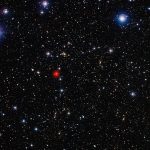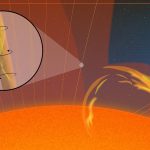Most giant stars in the early universe were born as pairs, study finds
A new study from Tel Aviv University (TAU) has revealed that most massive stars in the early universe were likely born in pairs —...
Ripples in space reveal second-generation black holes billions of light-years away
Astronomers have detected two extraordinary gravitational wave events that may have come from black holes formed in earlier black hole mergers — what scientists...
Young star’s fiery outbursts reveal secrets of how life began on Earth
Astronomers have caught a rare and exciting glimpse of a young sun-like star unleashing a powerful double burst of plasma — superheated gas similar...
Scientists discover life’s building blocks frozen around a baby star in a neighboring galaxy
Astronomers have made a groundbreaking discovery that could change how we think about life’s ingredients in the universe.
Using the James Webb Space Telescope (JWST),...
Scientists map the biggest structures in the universe
Astronomers have unveiled a new map of the universe’s largest structures—massive clusters of galaxies that stretch across millions of light-years.
These cosmic giants are helping...
Astronomers unveil hidden “dark” gas fueling star birth in the Milky Way
Astronomers have, for the first time, mapped a mysterious form of matter in our galaxy that had remained invisible until now.
Using the U.S. National...
Ancient “cosmic knots” may explain why the universe exists
More than 150 years ago, the famous British physicist Lord Kelvin imagined that atoms were tiny knots twisting through an invisible substance called the...
Scientists discover three Earth-sized planets orbiting two Suns
Astronomers have discovered a rare planetary system that seems straight out of science fiction — three Earth-sized planets orbiting two suns.
The system, called TOI-2267,...
Scientists finally detect hidden solar waves that could power the sun’s mysterious corona
For more than 80 years, scientists have been searching for a special kind of magnetic wave inside the sun that could help explain one...
How rare nuclear reactions in dying stars create gold and platinum
Where does gold really come from?
It turns out that the glittering metal on Earth has its roots in violent cosmic events — like exploding...










